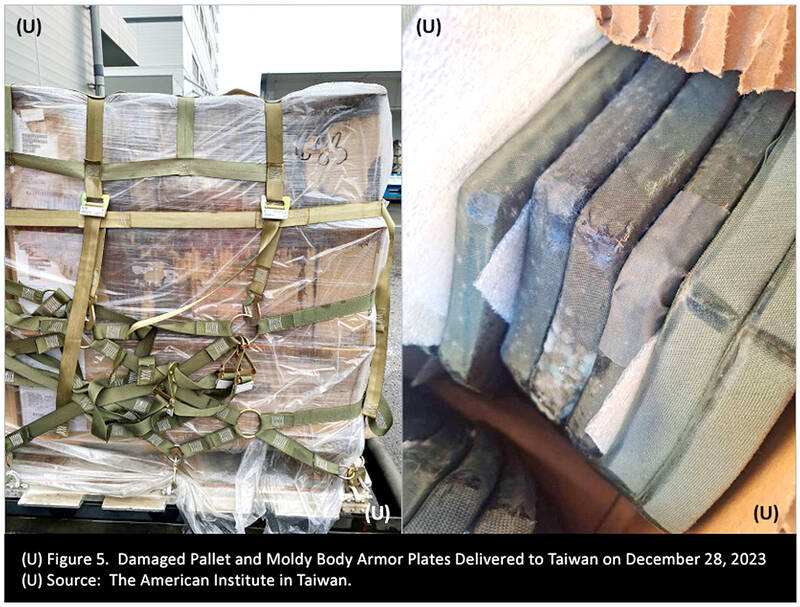The US Department of Defense (DOD) has taken action to make improvements after “unserviceable and poorly packaged” equipment and munitions were sent to Taiwan under the US Presidential Drawdown Authority (PDA), the department said on Friday.
The PDA is a process under which the US can send equipment and weapons from existing stocks to its allied partners in crisis situations.
In July last year, the administration of US President Joe Biden authorized as much as US$345 million in defense articles and services to be sent to Taiwan under the presidential drawdown.

Photo: Screen grab from US Department of Defense Office of Inspector General’s Web site
“Taiwan is a key security cooperation partner, and the US government is committed to ensuring that equipment delivered to this partner is sufficient for operational use,” department spokesman Pete Nguyen said.
The department would learn from this experience, which was the first of its kind, and “has taken action to improve its PDA process for Taiwan,” Nguyen said.
The response came after the department’s Office of Inspector General (OIG) revealed in its report last week that the department had provided shipments of unserviceable and poorly packaged equipment and munitions to Taiwan from November last year to March.
MOLDY BODY ARMOR
“We appreciate the perspective this report brings to a complex and unique issue for a critical security cooperation partner and anticipate the positive impact it will have on the department moving forward,” Nguyen said.
The department in December last year delivered to Taiwan 120 water damaged pallets, which contained wet and moldy body armor, according to personnel from the American Institute in Taiwan (AIT), the de facto US embassy, the OIG report said.
The pallets remained at Travis Air Force Base for more than three months because the US Army did not begin initiating requests for Special Airlift Assignment Mission flights to Taiwan until December, the OIG said.
Taiwanese authorities had to spend weeks “unpacking, drying and inventorying the wet and moldy equipment,” it said.
REVIEW
In the same month, the Ministry of National Defense issued a letter to the AIT stating that Taiwan received 2.7 million rounds of ammunition from the department, including some that were expired, in a mix of original, loose and incorrect packaging, it said.
“The DOD did not effectively or efficiently implement accountability and quality controls for items delivered to Taiwan,” it said in the report, adding that those actions “inhibit the DOD’s ability to achieve established security cooperation goals and may lead to loss of partner confidence in the United States.”
The ministry on Friday said the shipments of equipment and munitions have been jointly reviewed and handled accordingly by Taiwan and the US, without elaborating.

The US government has signed defense cooperation agreements with Japan and the Philippines to boost the deterrence capabilities of countries in the first island chain, a report by the National Security Bureau (NSB) showed. The main countries on the first island chain include the two nations and Taiwan. The bureau is to present the report at a meeting of the legislature’s Foreign Affairs and National Defense Committee tomorrow. The US military has deployed Typhon missile systems to Japan’s Yamaguchi Prefecture and Zambales province in the Philippines during their joint military exercises. It has also installed NMESIS anti-ship systems in Japan’s Okinawa

‘WIN-WIN’: The Philippines, and central and eastern European countries are important potential drone cooperation partners, Minister of Foreign Affairs Lin Chia-lung said Minister of Foreign Affairs Lin Chia-lung (林佳龍) in an interview published yesterday confirmed that there are joint ventures between Taiwan and Poland in the drone industry. Lin made the remark in an exclusive interview with the Chinese-language Liberty Times (the Taipei Times’ sister paper). The government-backed Taiwan Excellence Drone International Business Opportunities Alliance and the Polish Chamber of Unmanned Systems on Wednesday last week signed a memorandum of understanding in Poland to develop a “non-China” supply chain for drones and work together on key technologies. Asked if Taiwan prioritized Poland among central and eastern European countries in drone collaboration, Lin

BACK TO WORK? Prosecutors said they are considering filing an appeal, while the Hsinchu City Government said it has applied for Ann Kao’s reinstatement as mayor The High Court yesterday found suspended Hsinchu mayor Ann Kao (高虹安) not guilty of embezzling assistant fees, reducing her sentence to six months in prison commutable to a fine from seven years and four months. The verdict acquitted Kao of the corruption charge, but found her guilty of causing a public official to commit document forgery. The High Prosecutors’ Office said it is reviewing the ruling and considering whether to file an appeal. The Taipei District Court in July last year sentenced Kao to seven years and four months in prison, along with a four-year deprivation of civil rights, for contravening the Anti-Corruption

NO CONFIDENCE MOTION? The premier said that being toppled by the legislature for defending the Constitution would be a democratic badge of honor for him Premier Cho Jung-tai (卓榮泰) yesterday announced that the Cabinet would not countersign the amendments to the local revenue-sharing law passed by the Legislative Yuan last month. Cho said the decision not to countersign the amendments to the Act Governing the Allocation of Government Revenues and Expenditures (財政收支劃分法) was made in accordance with the Constitution. “The decision aims to safeguard our Constitution,” he said. The Constitution stipulates the president shall, in accordance with law, promulgate laws and issue mandates with the countersignature of the head of the Executive Yuan, or with the countersignatures of both the head of the Executive Yuan and ministers or